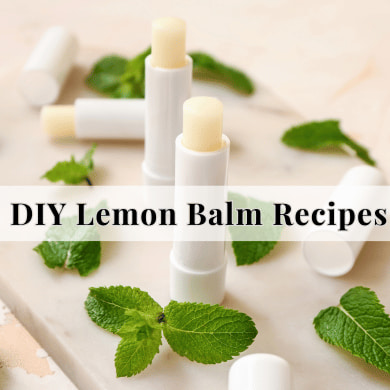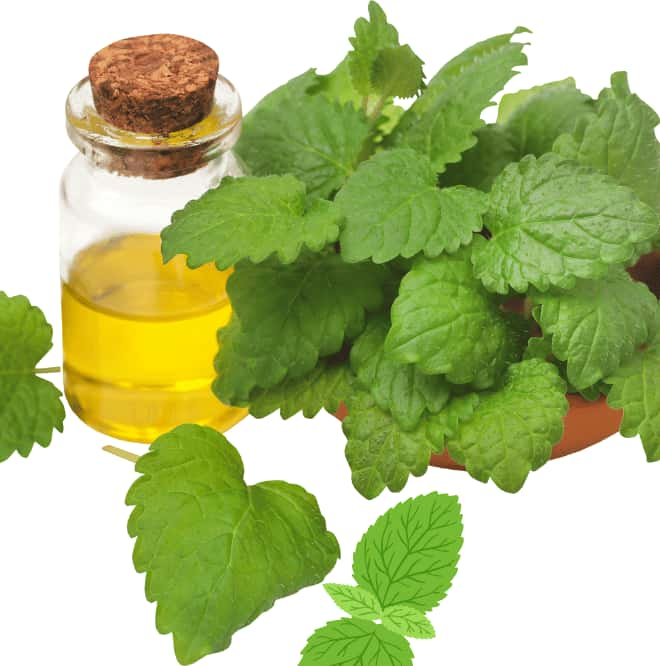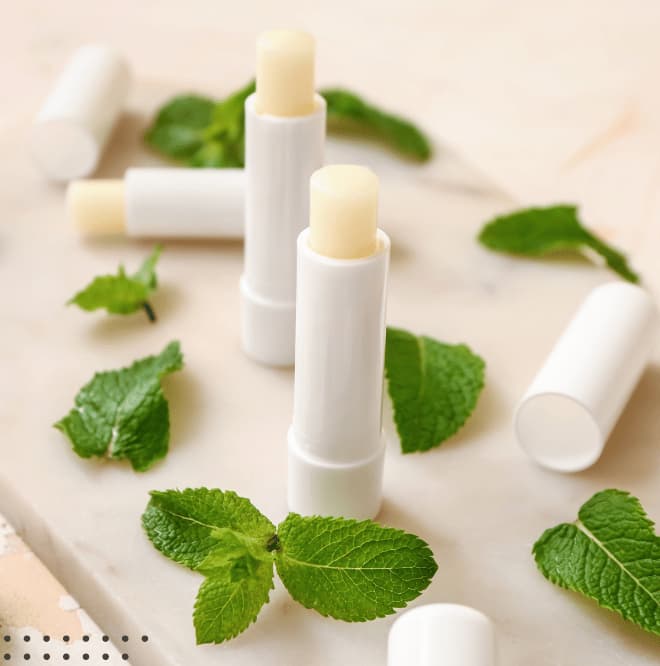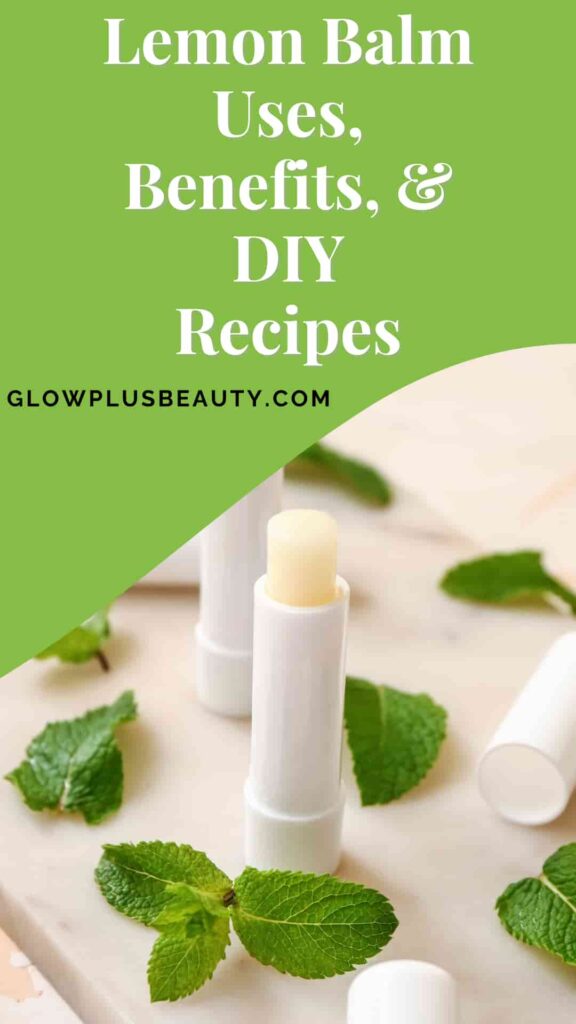Lemon Balm Uses, Benefits, and Recipes

If you’re looking for a natural, fragrant, and effective way to boost your skincare routine, look no further than lemon balm.
This wonderful herb has been cherished for centuries for its soothing properties and delightful aroma.
Fast forward to today, and it’s still making waves in the world of natural skincare.
In this blog post, we’ll explore what lemon balm is, the benefits it offers for your skin, and how you can incorporate it into your skincare regimen with some simple DIY recipes.
Interesting posts:
- 7 DIY Pink Lip Scrubs For Dark Lips | How To Make Your Own Lip Scrub At Home.
- 3 DIY To Get Pink Lips Naturally At Home| Pomegranate For Your Lips
- 10 Korean Water-Based Cleansers That Beauty Experts Swear By!
- 10 Reasons Why Red Clay Powder Should Be A Staple In Your Skincare Routine
- Is CeraVe Gluten-Free? Let’s Find Out If Safe For Gluten Sensitivity.
- Does CeraVe Cause Cancer? +10 Carcinogenic Ingredients To Watch Out For.
What is Lemon Balm?

Lemon Balm, or Melissa officinalis, is a green herb with a fresh, lemony scent. It’s part of the mint family, and just like its relatives, it’s super easy to grow.
This herb has been used for centuries, not just in the kitchen but also in the medicine cabinet.
Native to Europe, lemon balm has been used since ancient times to promote relaxation, improve mood, and enhance overall well-being.
But did you know it can also do wonders for your skin?
Why Your Skin Loves Lemon Balm
Benefits of Lemon Balm for Skin
Calming and Soothing effect: Lemon balm is known for its calming properties, which can help soothe irritated or inflamed skin.
If you have sensitive skin or conditions like eczema, lemon balm can provide gentle relief.
Anti-Aging Properties: Packed with antioxidants, lemon balm helps fight off free radicals, which are responsible for aging your skin.
Regular use can help reduce the appearance of fine lines and wrinkles, giving you a more youthful glow.
Clears Up Acne: Thanks to its antibacterial properties, lemon balm can be effective in combating acne.
It helps to reduce bacteria on the skin, which can prevent breakouts and keep your skin clear.
Healing Benefits: Lemon balm has antiviral properties that can aid in healing cold sores and other minor skin infections.
It speeds up the healing process, helping your skin recover faster.
Balances Oily Skin: If you struggle with oily skin, lemon balm can be a great addition to your skincare routine.
It helps to regulate the production of sebum, preventing your skin from becoming too oily and reducing shine.
Hydrates and Nourishes: Lemon balm is also hydrating, making it perfect for dry or dehydrated skin.
It assists in maintaining moisture, ensuring your skin stays soft.
Natural Sun Protection: Lemon balm contains rosmarinic acid, which has been found to offer some natural protection against UV rays.
While it shouldn’t replace your regular sunscreen, it can provide an extra layer of defense, reducing the damage caused by sun exposure.
Aromatherapy Benefits: The lovely, lemony scent of lemon balm is not just pleasant; it also has aromatherapy benefits that can help reduce stress and promote relaxation, which in turn benefits your skin.
Lemon Balm in Commercial Skincare Products
Natural skincare has really taken off lately, and one botanical ingredient that’s been getting a lot of attention is lemon balm.
It’s popping up in all sorts of skincare goodies, from creams to serums to masks.
These products use lemon balm to target specific skin types and concerns, so you can find something perfect for you.
But when you’re picking out lemon balm skincare, there are a few things to keep in mind.
First, check out how much lemon balm is actually in there. That concentration can make a big difference.
Also, take a peek at the other ingredients. You’ll want to make sure they’re good for your skin and won’t cause any allergies or irritation.
Basically, look for products that really focus on quality and getting the job done right.
Using Lemon Balm in Your Skincare Routine
You can add lemon balm to your skincare routine in many ways:
Incorporating Lemon Balm Oil: Lemon balm oil can be a fantastic addition to your skincare routine.
You can mix a few drops into your moisturizer or apply it directly to the skin to enjoy its soothing benefits.
DIY Lemon Balm Toner: A homemade lemon balm toner is easy to make. Simply steep fresh or dried lemon balm leaves in hot water, let it cool, strain, and store in a spray bottle.
Use this toner after cleansing to refresh and calm your skin.
Lemon Balm-Infused Moisturizers: Look for moisturizers that contain lemon balm extract.
These products harness the herb’s benefits, helping to hydrate and soothe your skin while protecting it from environmental stressors.
DIY Lemon Balm Skincare Recipes :

Ready to get crafty? Here are a couple of simple recipes to try at your home:
Lemon Balm Facial Toner: To make a refreshing lemon balm toner, steep a handful of fresh lemon balm leaves in hot water for about 10-15 minutes. Let it cool, then strain out the leaves and pour the infused water into a clean spray bottle.
Store it in the fridge for an extra cooling effect. Spritz it on your face whenever you need a quick pick-me-up or to refresh your skin throughout the day!
Lemon Balm Soothing Face Mask: Mix fresh crushed Lemon Balm leaves with honey/aloe vera gel for a soothing face mask.
You can also add turmeric powder or yogurt to get extra benefit. Leave it on for 10-15 minutes, then rinse off for soft, glowing, and bright skin.
Lemon Balm Infused Oil: Soak dried lemon balm leaves in jojoba, coconut, or sweet almond oil for a few weeks. This will create a versatile oil suitable for moisturizing, massages, or as a base for DIY skincare products.
Lemon Balm Lip Balm: Melt together some coconut oil, beeswax, and a few drops of lemon balm-infused oil. Pour the mixture into small lip balm containers and allow it to cool and solidify.
Apply whenever your lips need a hydrating boost and enjoy the subtle lemony scent!
Lemon Balm Body Scrub: Combine brown sugar, coconut oil, and lemon balm-infused oil for a scrub that exfoliates and moisturizes at the same time.
For a gentler version, you can use oats instead of sugar.
Tips for Using Lemon Balm in Skincare
Patch Test: Before using any new skincare product, especially DIY recipes, do a patch test on a small area of your skin to check for any allergic reactions.
Fresh is Best: Whenever possible, use fresh lemon balm leaves for maximum potency and benefits.
Storage: Store your lemon balm skincare products in a cool, dark place to prolong their shelf life.
Consistency: Be consistent with your use to see the best results over time.
Pro tip: “While lemon balm can help your skin, it’s important to take care of your skin in other ways too. Drink enough water, protect your skin from the sun, and live healthily.
Storing and Preserving Lemon Balm
To preserve lemon balm, dry the leaves by hanging them in a well-ventilated area away from direct sunlight.
Once dried, store the dried leaves in an airtight container. You can also make lemon balm extracts by steeping the leaves in alcohol or oil.
Final Thoughts:
Lemon Balm is more than just a pretty plant; it’s a powerhouse of benefits for your skin and your overall well-being.
Whether you’re whipping up a DIY recipe or choosing commercial products, lemon balm is a natural way to achieve healthier, more radiant skin.
So there you have it, I hope you find this post on Lemon Balm Uses, Benefits, and Recipes helpful.
Remember, the best skincare is the kind that makes you smile, and Lemon Balm is sure to do just that. Stay glowing, stay happy!
If you liked this post please save this pin below and follow us on Pinterest @Glowplusbeauty for more.




